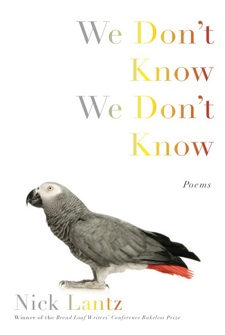Book Review
We Don’t Know We Don’t Know by Nick Lantz. Minneapolis, MN: Graywolf Press, 2010. $15 [Winner of the 2009 Katherine Bakeless Nason Prize for Poetry selected by Linda Gregerson and awarded by Middlebury College and the Bread Loaf Writers’ Conference]
Reviewed by Lisa Vihos
The title of Nick Lantz’s first collection, We Don’t Know We Don’t Know (Graywolf Press 2010) clues the reader right in: these poems are going to make you think. They make you scratch your head at times, and ponder the differences between “Known Unknowns” and “Unknowns Knowns,” which are two of the four section headings of this collection (the other two being, as you might suspect, “Known Knowns” and “Unknown Unknowns.”) Wow. Have I lost you yet?
Many of the poems are prefaced by short, shockingly garbled statements made by former Secretary of Defense, Donald Rumsfeld. They are perfectly insane comments that invite the mind of a poet-philosopher like Lantz to have at it. For example: “If I said yes, that would then suggest that that might be the only place where it might be done which would not be accurate, necessarily accurate. It might also not be inaccurate, but I’m disinclined to mislead anyone.” Come again, Don?
The interesting thing is how Lantz takes these crazy statements that were originally spoken in defense of the war in Iraq (a smokescreen moment thrown up to obfuscate a questionable situation), and allows them to bring forth poems that sharpen our focus on some poetic reality. For example, that Rumsfeldian conundrum quoted above launches a surprising meditation on light in which the speaker of the poem argues with his wife about the art of the Dutch painter, Jan Vermeer:
I want to believe in a room filled
with Vermeer’s light, the world
outside the room that glows so
warmly, the people who spend
all day gathered by the window.
Or the poem called “You’re Going to Be Told,” which deals with strained family relationships and the death of a mother, is prefaced by this statement from Rumsfeld: “I mean, you’re going to be told lots of things. You get told things every day that don’t happen. It doesn’t seem to bother people…The world thinks all these things happen. They never happened.”
You never had a brother. Your family:
a crackpot conspiracy theory, your mother’s
death from blood poisoning staged
on a Hollywood back lot.
Interspersed with the poems begun by Rumsfeld epigraphs, are poems that open with quotes by Pliny the Elder. Linda Gregerson, in the introduction to the collection, points out how fitting and “about time” it is that Pliny and Rumsfield share the epigraphic limelight, a conversation between an obfuscator of what is known and a clarifier of same that is deftly orchestrated by Lantz as the collection builds.
“Of Dogges,” a poem that aches from the knowledge that all things pass away, leads with this from Pliny: “They alone know their own names.” In the poem, a grey dog goes by the speaker’s house everyday. As the poem unfolds, we are reminded that when we allow life to become routine, something will happen (a dog might be hit by a car for example), that reminds us how easy it is to go through life asleep, misunderstanding that which is in plain sight.
The subject matter of Lantz’s poetry is occasionally difficult, as in the single poem in the “Known Unknowns” section, called “Will There Be More Than One ‘Questioner?’” This poem riffs off of a found document, allegedly, a CIA Human Resources Exploitation Training Manual from 1983. The poem is constructed from a series of questions that one ought to consider in preparation for a prisoner’s interrogation. A random sampling of these questions include:
Will you read the name on his dossier before entering the cell?
Will you have an unconscious man dragged past the open door at a predetermined time?
Will you ask questions you know are beyond his knowledge?
Will you remember that the anticipation of pain is more acute than pain itself?
Months later, will you recognize his wife buying loose tea and oranges from the market?
Lantz’s poem are deep, dense, and intense. We sense we are in the presence of a writer who knows a lot about a lot of different things; the term “encyclopedic” comes to mind. Or, if he doesn’t actually know a lot, he is in awe of the incredible amount of things there are to know, and he is very good at connecting the dots between them for us, metaphorically speaking. The occasional “difficult” poem is then offset by one that is infinitely accessible. I am referring to the poem called “List of Things We Know,” that begins,
40% of all
births are accidental.
10% of all accidents
are births.
Kindness
is correlated
to detached
earlobes,
a damaged
amygdala,
a person’s
credit rating,
but in all cases
the direction
of causality
is unclear.
The challenge of reading Lantz’s poems pays off. Stick with him, and you find yourself getting into the Nick Lantz groove, gestalting things that you may not at first have understood, remarking, “perhaps I ought to think a little harder more often.”
Lisa Vihos worked for twenty years as an art museum educator and is now the Director of Alumni Relations at Lakeland College. Her poems have appeared previously in Verse Wisconsin, and in Free Verse, Lakefire, Wisconsin People and Ideas, Seems,and Big Muddy. She resides in Sheboygan and maintains a weekly blog, http://www.lisapoemoftheweek.blogspot.com/.


